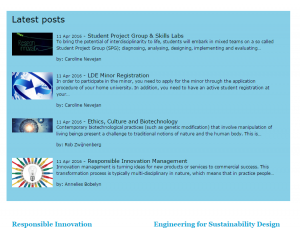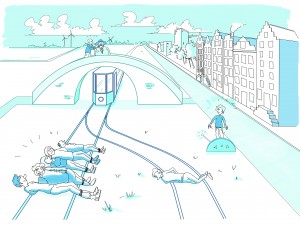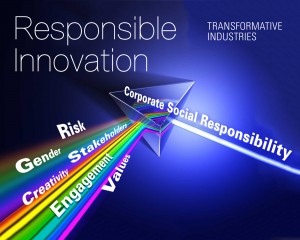Posted in 2016
From MOOC to book: latest version textbook on Responsible Innovation
This is the latest version of our textbook based on the MOOC Responsible Innovation:
Responsible Innovation_from Mooc to book_ March.
Good luck studying!
Joost Groot Kormelink
Project update: a lot is going on!
A lot of project work in going on this summer. High time to summarize the status of our main results
1.Online courses for becoming a chartered engineer
TU Delft has partnered with KIVI to offer a range of online courses for engineers who want to meet the formal education requirements required to both obtain and maintain the Chartered Engineer qualification licensed by KIVI.
Chartered Engineer is an internationally recognized engineering qualification. Engineers can distinguish themselves with an independent professional qualification that represents the highest competence and commitment standards of their profession.
At this stage we can announce the following courses for the year 2016-2017 (including start date and KIVI’s competence for chartered engineers):
- Ethical Conduct(November 2016, key competence: E1)
- Leadership for Responsible Innovation(December 2016, key competence: B3 and C1)
- Safety Culture(January 2017, key competence: C1)
- Designing for Values(March 2017, key competence: B3)
- Responsibility for Risk and ‘The Problem of the Many Hands’(April 2017, key competence: C1)
2. Joint platform for minors Responsible Education, International Development and Entrepreneurship, Companies and Innovation as well as the course Sustainable Development
We will also develop a joint platform for the minors Responsible Education, International Development and Entrepreneurship, Companies and Innovation as well as the course Sustainable Development offered by Delft University of Technology in 2016/17.These minors have in common that they focus on core values such as safety, sustainability and inclusiveness and that students work on concrete case studies throughout the course. Students are obliged have to publish their findings for the broader public after a peer review process. The platform provides all the functionalities (workspaces) for joint project works and the peer review process.
The website is still under development but will be up and running before September 1, 2016. At this website you will find:
- A lot of interesting Open Educational resources (OER) which mainly comes from our MOOCs which we also use as background materials for our students. Much more is coming up!
- Final publications (peer reviewed) and blogs from student’s on their research (we already published a selection form last year)
- Ways to contact us for possible research assignments by students
3. (Didactical) Experiments within MOOC RI
- We had a very successful re-use of the MOOC RI in our minor RI (‘ MOOC for blended education’ ). See below
- MOOC RI will be part of a bigger experiment from the TU Delft titled’ Credit for MOOCs’.
Currently TU Delft aims at setting up an alliance with several international partners, like the University of Queensland, the University of British Columbia, EPFL, Rice University and Australian National University. Their shared ambition is to recognize and integrate MOOCs in (formal) campus education. This would mean that in the future any student registered at one of the partner universities can take any MOOC offered by these universities and be awarded formal Credits for it. For the MOOC RI we have expressed our interest to participate in this pilot which be launched end of 2016. In the meantime, a lot of practical issues – like proctored exams, re-sits and obtaining formal recognition by the examination boards- have to be resolved. - We tested the impact of students seeing their progress compared with other students.
- We developed an e-book (text) on the basis of the MOOC RI. Our aim is this this becomes part of the Open Textbook experiment of the TU Delft.
4. Repository in Blackboard
We have created a dummy course (repository) in Blackboard with all the materials which can be re-used on campus. To the extent possible, we will also publish tense as Open Educational Resources.
5. Internationalization
So far we attended 3 conferences on RI related EU-projects (Leuven, Brussels and Dublin). From these conferences it becomes clear that the way we develop and publish OER in the field of RI is still unique.
As part of two EU-funded project we will develop new MOOCs with a focus on RI and Corporate Social responsibility and ICT and Ethics. September 2016 is the kick-off meeting for both projects (details below). To give you an idea about what to expect:
In October we will present our results during the EADTU-conference in Rome (including open access article).
MOOC RI for credits (ECTS)
Currently TU Delft aims at setting up an alliance with several international partners, like the University of Queensland, the University of British Columbia, EPFL, Rice University and Australian National University. Their shared ambition is to recognize and integrate MOOCs in (formal) campus education. This would mean that in the future any student registered at one of the partner universities can take any MOOC offered by these universities and be awarded formal Credits for it.
To quote Anka Mulder, Vice-President for Education & Operations at TU Delft, : offering credits for MOOCs is a big step for brick and mortar universities.”
For the MOOC RI we have expressed our interest to participate in this pilot which be launched end of 2016. In the meantime, a lot of practical issues – like proctored exams, re-sits and obtaining formal recognition by the examination boards- have to be resolved.
EU projects Responsible Research and Innovation
Below an overview (not necessarily complete) of EU-funded RRI-projects
- ENGAGE2020 (http://engage2020.eu/)
The goal of Engage2020 is to increase the use of engagement methods and policies by mapping what is practiced and spreading awareness of the opportunities amongst researchers, policymakers and other interested parties. - GREAT (http://www.great-project.eu/)
The GREAT project aims to develop an empirically based and theoretically sound model of the role of responsible research and innovation governance and investigate the characteristics of responsible practices. - PERARES http://www.livingknowledge.org/projects/perares/
The PERARES project aims to strengthen public engagement in research by involving researchers and Civil Society Organisations in the formulation of research agendas and the research process. - PROGRESS (http://www.progressproject.eu/)
The ProGReSS project aims to advocate a European normative model for RRI globally, using constitutional values as a driver to inform societal desirability. - RESAGORA (http://res-agora.eu/news/)
The ResAGorA project aims at doing extensive research about existing RRI governance across different scientific and technological areas, continuous monitoring of RRI trends and developments in selected countries, and constructive negotiations and deliberation between key stakeholders. - RESPONSIBILITY (http://responsibility-rri.eu/)
The goal of the Responsibility project is to develop a virtual observatory for enhancing the interaction among research outcomes and policy making, incorporating the full potential of scientific achievements in the policy development and implementation. - RRI-tools http://www.rri-tools.eu/
This project develops a toolkit for RRI - ENRRICH (http://www.livingknowledge.org/projects/enrrich/)
The Enhancing Responsible Research and Innovation through Curricula in Higher Education (EnRRICH) project will improve the capacity of students and staff in higher education to develop knowledge, skills and attitudes to support the embedding of Responsible Research and Innovation (RRI) in curricula by responding to the research needs of society as expressed by civil society organisations (CSOs) - KARIM (http://www.karimnetwork.com/)
KARIM is the Knowledge Acceleration and Responsible Innovation Meta-network, a European project that aimed to develop transnational connections between universities, innovation-support agencies and SMEs, with a focus on responsible innovation
Website with open educational resources and student’s work
One of the deliverables of the project is an interactive website which will integrate 2 minors (Responsible innovation and international development and entrepreneurship) one course (Engineering for Sustainable Design) and our large collection of open education materials.
Students will use the resources but also publish the results of their projects and research. This will be done by a peer reviewed process which is currently under development.
MOOC RI is live since April 11, 2016
The MOOC Responsible Innovation is live since since April 11, 2016. The course consists of 3 parts:
- In part 1, we will focus on ethics and values including individual and collective responsibilities. For example, who is to blame in a case of a fatal accident when many parties are involved? How should we deal with conflicting demands, ethical issues and emotions when it comes to new technology?
We will also discuss the famous trolley problem and the NIMBY (Not in my backyard) problem,. Our case studies concerns robotics - The second part of the course (start: April 24, 2016) is all about safety and risk assessments. We will discuss the fundamentals of understanding and identifying risk. Our case studies are climate change, nanoparticles, coolants, nuclear energy and Cyber-Security.
- The third part (start May 9, 2016) will first focus on technological innovations – incremental, radical and frugal – from an economic, management and design aspect. Last, but not least, the course will end with the concept of Value-Sensitive Design and this is what our final assignment will be all about.
Below the weblecture about ethics and care robots.
From MOOC to book
Our from ‘ MOOC to book’ project is almost ready. The E-book is based on the MOOC responsible Innovation offered on the edX platform is 2014/15 and will be used (and updated) for the next edition.
This is a sneak preview.
Trolley problem
One of TU Delft students (Ayelt van Veen, just graduated) made some great drawings which we will use for the Surf-project responsible innovation. This picture is about the famous trolley problem and (impossible) decisions to be made. Theoretical? Not al all. Think about drones or self driving vehicles
Funding for 2 EU-projects
Some great news: two proposals have been approved by the EU:
- PRISMA: Piloting Responsible Research Innovation in Industry: a roadmap for tranSforMAtive technologies’.
The faculty of TPM received a European research grant for PRISMA, a Responsible Research Innovation (RRI) project conducted together with colleagues from the faculty of Applied Sciences and other international universities and institutes. There is now only limited experience with RRI in industry and there is also limited evidence of the added value of opening up the innovation process in industry for social engagement and gender considerations.In the PRISMA project, eight RRI pilot projects will be carried out in a real-world industry context. To establish the added value of the RRI approach and the gender dimension in and for industry, the team will assess pilot projects on a number of product and process RRI dimensions and compare the score of the pilots on the relevant RRI dimensions with the score of similar projects in the same companies in which the RRI approach has not been followed. The team will focus on implementing RRI for some of the major technological challenges in the EU including nanotechnology, synthetic biology, Internet of Things and self-driving or automated cars.More info: http://www.tbm.tudelft.nl/nl/actueel/laatste-nieuws/artikel/detail/eu-h2020-grant-for-prisma/
- CANVAS: Constructing an Alliance for Value-driven Cybersecurity.
CANVAS consists of partners from various scientific traditions: ethical, legal, empirical and technological from 11 universities. Main goals of the consortium are to:
- Structure existing knowledge in ethics, law, empirical and technological research related to cybersecurity
- Design a network for exchanging knowledge
- Disseminate the insights gained through various means such as briefing packages for policy stakeholders and a Massive Open Online Course (MOOC).
TU Delft will lead the Knowledge Consolidation Ethics work package due to its internationally recognised activities in the area of “responsible innovation” and its renowned contributions to the field of ethics and ICT.
More info: http://www.tbm.tudelft.nl/en/current/latest-news/article/detail/erc-grant-for-canvas/
Both projects include online education & MOOCs to disseminate the results of the project.




Recent Comments